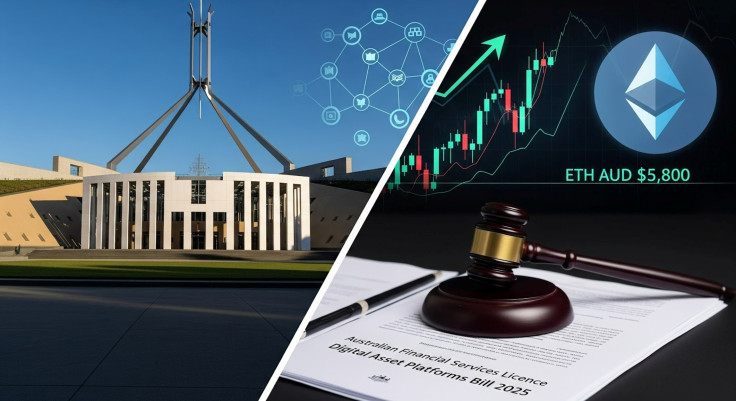Understanding Australia's New Financial Licensing Framework for Digital Asset Operators

Australia's digital asset sector enters a defining regulatory phase as Treasury's draft legislation mandates Australian Financial Services Licence requirements for cryptocurrency platforms. Released on September 25, 2025, the proposed framework extends existing financial services laws to cover Digital Asset Platforms and Tokenised Custody Platforms, bringing operators under direct oversight by the Australian Securities and Investments Commission. Understanding price metrics like ethereum price aud, currently trading around $5,800 AUD based on October 2025 valuations, becomes increasingly important as regulatory clarity transforms market transparency and establishes standardized consumer protections across the sector.
Core Legislative Requirements
The draft legislation introduces Digital Asset Platforms and Tokenised Custody Platforms as new financial product categories within the Corporations Act 2001. Entities providing specified services related to these platforms must obtain an AFSL, subjecting them to licensing obligations, governance standards, and consumer protection requirements consistent with traditional financial service providers. Assistant Treasurer Daniel Mulino emphasized that the reforms extend existing financial services laws in a targeted manner rather than creating entirely new regulatory architecture.
Platforms transacting more than $10 million annually and holding over $5,000 per customer fall within the licensing scope, while smaller operators may qualify for exemptions. The framework establishes obligations relating to custody arrangements, settlement processes, tokenisation activities, staking services, governance structures, disclosure requirements, and consumer protection standards. Significant penalties apply for operating without appropriate licensing, with enforcement responsibility assigned to ASIC.
Market Transparency Enhancements
Regulatory clarity fundamentally improves market transparency by establishing standardized reporting requirements and operational disclosure obligations. Licensed platforms must maintain comprehensive audit trails, implement robust custody protocols, and provide clear consumer disclosures regarding fee structures, risks, and operational processes. This transparency extends to price formation mechanisms, with regulated exchanges required to demonstrate fair dealing practices and market integrity safeguards.
When evaluating ethereum price aud movements across different platforms, investors gain confidence that licensed exchanges implement consistent valuation methodologies and transparent pricing structures. The framework addresses information asymmetries that previously disadvantaged retail investors by mandating disclosure standards comparable to traditional securities markets. Treasury indicates these reforms will assist global firms in recognizing Australia as a credible, well-regulated hub for digital asset innovation.
Consumer Protection Framework
The AFSL regime brings crypto platforms under the same consumer protection standards applicable to share trading, forex, and other investment services. Licensed operators must comply with conflict of interest management requirements, dispute resolution procedures, and compensation arrangements that protect consumers against platform insolvency or misconduct. ASIC's updated guidance on crypto-assets, expected for publication following December 2024 consultations, provides clarity on how current financial product definitions apply to digital assets, including stablecoins, exchange tokens, and commodity-linked instruments.
The framework adopts a "same risk, same regulation" approach aligned with jurisdictions including the European Union and United Kingdom, targeting activities through Australian domestic concepts of financial product and financial service. This consistency ensures Australian consumers receive protections equivalent to those in major global markets while preventing regulatory arbitrage that undermines investor safety.
Implementation Timeline and Compliance Costs
The consultation period on exposure draft legislation closed on October 24, 2025, with implementation potentially commencing later this year. Once effective, crypto businesses receive six months to initiate registration and twelve months to complete licensing processes. Meeting ASIC compliance standards imposes substantial costs, particularly for smaller businesses lacking existing regulatory infrastructure.
Building a compliant exchange from scratch ranges between $100,000 and $500,000, while ongoing compliance costs include audit requirements, reporting systems, custody arrangements, and professional staffing. These expenses likely drive sector consolidation as smaller platforms either cease Australian operations, merge with licensed entities, or transition to niche services outside regulatory scope. Kate Cooper, CEO of OKX Australia, notes the legislation signals crypto is no longer operating on the fringes but is fully embedded in the financial system.
Global Regulatory Alignment
Australia's framework demonstrates international coordination on digital asset regulation, with the Treasury explicitly designing reforms to align with peer jurisdictions. The approach complements Financial Stability Board recommendations for adequate transparency, accountability, market integrity, and investor protections across crypto-asset ecosystems. New ministerial powers enable the designation of facilities as financial markets or clearing and settlement facilities, providing flexibility to adapt regulatory treatment as technologies evolve.
ASIC's support for innovation continues through targeted exemptions, including regulatory relief for Project Acacia participants, enabling real-world testing of tokenised asset transactions and digital money. This balanced approach encourages responsible innovation while establishing guardrails that address financial stability risks arising from growing interconnections between crypto-assets and traditional financial systems.
© Copyright 2025 IBTimes AU. All rights reserved.





















